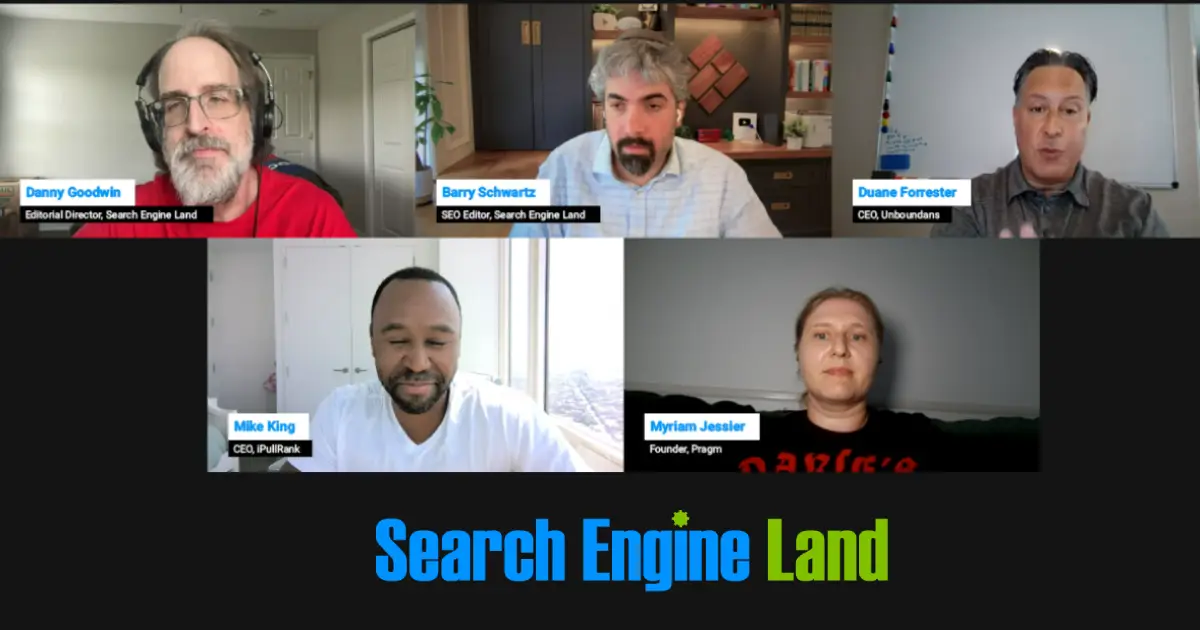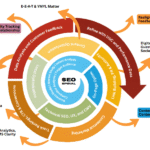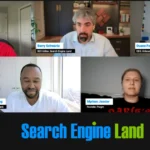The definition of “search” is changing in real time. Even though SEO evolves fast, the very idea of “search” will remain as long as there are products in business warehouses and people on the streets to buy them.
The bridge between these two entities is the marketing channel, which we can label with any acronym – SEO, GEO, AEO, or anything else – but the idea itself is original and lasting.
In this blog post, I would like to invite your attention to a detailed debate conducted by Search Engine Land on the future of SEO in the AI era. I will take you through the key takeaways of the debate under various hot topics.
The debate, led by Danny Goodwin, the Editorial Director of Search Engine Land, featured chief guests Barry Schwartz (Veteran SEO Journalist, Search Engine Land), Michael King (CEO, iPullRank), Myriam Jessier (Consultant, Pragm), and Duane Forrester (CEO, UnboundAnswers) as participants.
1. Is SEO Dead or Just Evolving?
Mike King (iPullRank)
- SEO is “deprecated” – traditional tactics still work but are no longer sufficient.
- AI search (e.g., Google’s AI Overviews) requires new strategies (e.g., optimizing for passage retrieval and query fan-out).
- Only 25% of top 10 organic results appear in AI Overviews, meaning SEOs must adapt.
Duane Forrester (UnboundAnswers)
- SEO is transitioning from “high school to university” – new complexity is added, but fundamentals still matter.
- Companies slow to adopt modern SEO (e.g., structured data) are being left behind.
- The industry is moving at a “26-mile sprint” pace – adapt or fall behind.
Myriam Jessier (Pragm)
- Old-school SEO (2000s tactics) is dead, but modern SEO is alive – just different.
- AI introduces new challenges: hallucinations, brand misattribution, and multimodal search (e.g., image/video optimization).
- SEOs must now collaborate with legal, social media, and branding teams – no more working in silos.
Barry Schwartz (Search Engine Land)
- SEO isn’t dying – it’s expanding. The best SEOs have always adapted (e.g., from links to entities to AI).
- Google claims “nothing changes” for SEO fundamentals, but tracking ROI (e.g., clicks vs. AI mentions) will shift.
2. How AI is Changing Search Behavior
Mike King
- AI answers reduce clicks to websites – focus on brand visibility in AI responses.
- Omnichannel content (Reddit, YouTube, LinkedIn) now impacts AI rankings.
Duane Forrester
- 700M+ users trust AI answers without questioning accuracy – brands must monitor AI-generated narratives.
- Example: Bought a washing machine via ChatGPT’s recommendation in less than 24 hours – zero clicks to a website.
Myriam Jessier
- AI “brand drift” is real (e.g., false info, memes, outdated lawsuits resurfacing in AI answers).
- Multimodal search (images, video) is critical – optimize packaging, product demos, etc.
Barry Schwartz
- AI answers feel like talking to a “confident but clueless friend”– often wrong but improving.
- Users blindly trust AI outputs, creating reputation risks for brands.
3. Skills & Strategies for the AI Era
Mike King
- Demand better tools (e.g., AI-specific analytics)
- Learn vector embeddings and how AI retrieves content.
- Shift measurement from clicks to AI mentions, citations, and conversions.
Duane Forrester
- Hire for new skills now (e.g., query fan-out, LLM optimization).
- Track AI performance via daily prompt testing across ChatGPT, Gemini, etc.
Myriam Jessier
- Disable JavaScript to check if core content is AI-crawlable.
- Downvote bad AI answers (feedback shapes future outputs).
- Monitor Reddit/social chatter – AI scrapes forums heavily.
Barry Schwartz
- Branding is now SEO’s top priority (AI won’t link – it mentions).
- Experiment with AI agents (e.g., shopping bots, customer service automation).
4. The Big Picture: What’s Next?
- Consolidation coming: AI tools will merge (e.g., Profound’s $20M funding signals a shakeout).
- Universal verifiers (fact-checking AI) are 2–3 years away – expect chaos until then.
- SEO salaries must rise – AI work is more complex but still undervalued.
Abdul Vahid is an online business growth strategist and SEO expert based in the Middle East. With over 15 years of experience in driving data-driven organic and paid growth, he has helped eCommerce and performance-focused brands generate more than $2.5M in organic revenue. He specializes in crafting strategies that boost visibility, increase traffic, and turn digital efforts into measurable business results.




